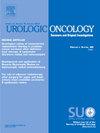METABOLIC, CARDIAC, AND BONE HEALTH TESTING IN PROSTATE CANCER PATIENTS ON ANDROGEN DEPRIVATION THERAPY: A POPULATION-BASED ASSESSMENT OF ADHERENCE TO THERAPEUTIC MONITORING GUIDELINES
IF 2.4
3区 医学
Q3 ONCOLOGY
Urologic Oncology-seminars and Original Investigations
Pub Date : 2025-03-01
DOI:10.1016/j.urolonc.2024.12.017
引用次数: 0
Abstract
Introduction
Androgen deprivation therapy (ADT) remains a cornerstone in treatment for patients with advanced prostate cancer. ADT is associated with several adverse effects including osteoporosis, metabolic syndrome, and cardiovascular events, leading to guidelines recommending routine testing to monitor for these toxicities. There is a lack of data assessing adherence to these recommendations.
Methods
We conducted an observational, retrospective cohort study utilizing administrative data sources in Ontario, Canada between 2008-2021. We identified all men receiving ADT for prostate cancer. The primary outcomes were use of lipids, dysglycemia (glucose), bone health serum and bone density testing between 6 weeks preceding and 1 year following initiation of ADT. Secondary outcomes included predictors of adherence to testing.
Results
We examined 29,097 patients of whom 52.8% were prescribed ADT by Urologists, 37.9% by Radiation Oncologists, 2.8% by Medical Oncologists, and 2.4% by other physicians. Adherence to guidelines was generally low: only 21.3% of patients received a bone density scan, 41.2% underwent bone-health-related serum tests, 51.3% had a lipid profile completed, and 65.9% underwent dysglycemia testing within 1 year of diagnosis. Overall, only 11.9% of patients received all the recommended investigations. Adherence to testing did not appear to improve over time (2008-2021) or with the publication of guidelines. Patient (age) and physician (specialty) factors showed important associations with adherence to testing. ADT prescription by a Medical Oncologist was associated with a lower likelihood of undergoing screening tests for plasma glucose (RR 0.78, 95% CI 0.64-0.96, p=0.02), lipids (RR 0.65, 95% CI 0.58-0.80, p=<0.01) and bone density (RR 0.62, 95% CI 0.43-0.89, p=0.009) within a year when compared to prescription by Urologists. Increasing patient age was associated with lower adherence to screening guidelines for lipids (RR 0.26, 95% CI 0.12-0.62, p=0.002) and bone health (RR 0.37, 95% CI 0.17-0.83, p=0.016).
Conclusions
Most patients receiving ADT for prostate cancer do not receive recommended testing to monitor for treatment-related toxicity. Further study is required to identify and address barriers to therapeutic monitoring of men on ADT and reduce treatment-associated adverse events.
求助全文
约1分钟内获得全文
求助全文
来源期刊
CiteScore
4.80
自引率
3.70%
发文量
297
审稿时长
7.6 weeks
期刊介绍:
Urologic Oncology: Seminars and Original Investigations is the official journal of the Society of Urologic Oncology. The journal publishes practical, timely, and relevant clinical and basic science research articles which address any aspect of urologic oncology. Each issue comprises original research, news and topics, survey articles providing short commentaries on other important articles in the urologic oncology literature, and reviews including an in-depth Seminar examining a specific clinical dilemma. The journal periodically publishes supplement issues devoted to areas of current interest to the urologic oncology community. Articles published are of interest to researchers and the clinicians involved in the practice of urologic oncology including urologists, oncologists, and radiologists.

 求助内容:
求助内容: 应助结果提醒方式:
应助结果提醒方式:


